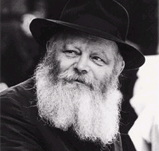Home
Letters
Article
Pictures
Soul Meetings
About
Contact
Search

The
Rebbe:
“Education the cornerstone to humanity”

Education Day USA - 1978
On this auspicious occasion, in the month of Nissan on the eve of the Festival of Pesach, the Festival of Liberation, it is particularly pertinent to begin with an expression of gratitude to the Al-mighty for His infinite kindness to each and all of us gathered here, and elsewhere in many places in various parts of world.
Indeed, recognition and appreciation of any kindness or benevolence, whether it is received directly from G-d or through the agency of a fellow human being — is one of the basic teachings of the Torah. It is also the underlying basis of many of the Divine precepts of the Torah, beginning with the first of the Ten Commandments ("I am the L-rd thy G-d, who brought thee out of the land of Egypt, from the house of bondage"), and including such an elementary obligation as "Honor thy father and thy mother."
In honoring one's parents, one must remember to honor also, and especially, the third "partner," namely, our Heavenly Father, who not only gives life to the new-born child, but also to the other two partners, the child's parents. And if honoring one's parents means gratifying their wishes and making them justly proud of their off-spring, how much more so it is incumbent upon everyone to order one's daily life and conduct in accord with the Divine Will. Hence the rule, "Know Him in all your ways" (Prov. 3:6), meaning that awareness of G-d must pervade every aspect and detail of the everyday life. (Maimonides, Code, Section De'ot 3:3)
All our festivals, beginning with Pesach, commemorating the liberation of our people from bondage to Pharaoh and the prelude to our receiving the Torah at Sinai, giving us also true freedom spiritually, are occasions for express-sing our gratitude to G-d. So are many precepts in the Torah—such as Bikkurim, the offering of the First Fruits, as well as tithes and gifts to the poor, etc. expressions of our gratitude to G-d for His benevolence and bounties.
In keeping with the principle of recognition and appreciation, I wish to express my appreciation and gratitude to all the well wishers who came to participate in this gathering and in similar gatherings in various parts of the United States, especially in the Nation's Capital, as well as overseas: no less also to all those who were kind enough to send me messages of greeting and blessing on the occasion of my birthday.
I gratefully acknowledge all these felicitations as expressions of affinity with the movement which 1 am privileged to head, and as tributes to it in recognition of its services to the lands and peoples hosting its educational, cultural and philanthropic institutions.
Mindful of the exhortation, "Seek the peace of the city (and land) whither I have caused you to be exiled, and pray unto the L-rd for it; for in the peace thereof shall you have peace" (Jer. 29:7), we are particularly grateful for the freedom and conducive atmosphere prevailing in these great and blessed United States where my revered predecessor, my father-in-law of saintly memory, transplanted the headquarters of our movement in 1940, under whose leadership, in the last decade of his dedicated life, the movement took root and flourished, and has borne fruits and fruits of fruits, "like a spring flowing with ever-growing vigor."
I heartily reciprocate all the good wishes in the words of our Sages, "He who blesses others is blessed by G-d Himself in a most generous measure" (Talmud B. Sotah 38b; Yerushalmi, Ber. 8:5), in accordance with the Divine blessing to our Patriarch Abraham, "I will bless them that bless thee" (Gen. 12:3)
"EDUCATION DAY, U.S.A."
Most deserving of our very profound appreciation is one of the most meaningful actions by the U.S. Congress who, in a joint resolution, carried by a two-thirds majority in the House of Representatives and by unanimous vote in the Senate, authorized and requested the President of the United States to proclaim this day as "Education Day, USA," which the President graciously signed into law.
While the timing of this action was conceived as a tribute to our movement, which sees in education the cornerstone not only of Jewish life, but of humanity at large, and has been dedicated to this vital cause ever since its inception more than two hundred years ago—it is a fitting and timely tribute to the cause of education in general, focusing attention on what is surely one of the Nation's top priorities.
It is fitting indeed that the U.S.A. has shown, through a forceful example to the world, that it places education among its foremost priorities. It is also to be hoped that "Education Day" will become a permanent institution, especially since, by reason of the pervasive nature of education, it would lend further significance to other "Days" such as Father's Day and Mother's Day and similar institutions which have become part of American life.
The proclamation of "Education Day, USA" is of extraordinary significance in impressing upon citizens the importance of education, both in their own lives as well as, and even more so, for the young generation in the formative years—particularly in the present day and age.
IN RETROSPECT AND PROSPECT
We have now concluded the "Year of Education" proclaimed last year on this day. This calls for review and introspection. In all humility we can say that with G-d's help it has been a very successful year for education, with the addition of numerous educational facilities on all levels in the U.S.A. and in many parts of the world; a substantially increased enrollment; and upgrading the quality of education. However, needless to say, as long as there is still one child that does not receive an adequate education, we can neither be satisfied nor slacken our efforts. On the contrary, the successful "Education Campaign" should spur us to even greater efforts in the ensuing year. It is human nature that ambition grows with achievement. If this is so in regard to material riches, how much more so in regard to real and eternal values. Moreover, since this trait of the human nature to strive for ever greater spiritual advancement has been given to every human being by the Creator, as a commendable factor, it is self understood that the Creator provides, at the same time, the capability and opportunities to translate it into tangible results, for "G-d requests of people only according to their powers (that He has given them)" (Midrash Bamidbar 13:3). Thus, in the Final analysis, it is mainly a matter of one's own will and determination. And let no one be satisfied with just a little greater effort for the cause of education, but—in keeping fully with human nature as cited above, double and redouble one's efforts for so vital a cause.
Education, in general, should not be limited to the acquisition of knowledge and preparation for a career, or, in common parlance, "to make a better living." And we must think in terms of a '"better living" not only for the individual, but also for the society as a whole. The educational system must, therefore, pay more attention, indeed the main attention, to the building of character, with emphasis on moral and ethical values. (Need one be reminded of what happened in our lifetime in a country that ranked among the foremost in science, technology, philosophy, etc.?)
Education must put greater emphasis on the promotion of fundamental human rights and obligations of justice and morality, which are the basis of any human society, if it is to be truly human and not turn into a jungle.
"FOREIGN AID" TO EDUCATION
The United States of America has a long-standing policy of foreign aid to developing countries, through direct grants and through U.N. agencies. Economic aid to foreign countries includes also cultural aid for the promotion and support of cultural programs, etc.
It is generally recognized, at any rate among the free and democratic nations, that each nation is a member of the Family of nations, and all must live together in "the world" which is like one organism. When any part of an organism ails, it affects the whole body; strengthening any part of the body strengthens the whole.
The record of this Nation's foreign aid is unexcelled in the annals of history, which is as it should be for a Nation so generously blessed by the Al-mighty. One would wish, however, for more affirmative action in the area of cultural, particularly educational, programs.
Economic aid given to a developing country is meant to be used most efficiently and productively. While the conditions attached to such aid must necessarily be limited and circumspect, there are certain conditions which are considered prerequisites. To cite a recent example. President Carter has taken a courageous stand on Human Rights, dismissing the notion that it is an "internal matter," and he has made it also a condition of Foreign Aid. It is to the President's credit that he has not only raised this issue, but has succeeded in arousing the world's "interest" in behalf of this cause. "Unofficially " however, there is a great deal more that the U.S. government can do to make foreign aid even more productive.
This Nation, with a healthy intuition, indeed, conviction, recognized that its economic system must not be based on crass materialism. Nothing expresses this idea more eloquently and forcefully than the motto on the American Dollar—"In God We Trust."
In giving out billions of dollars in foreign aid, many discreet ways can be found to have the beneficiaries take a look and ponder on this inscription, with a view to encouraging them to recognize the importance of Trust in G-d, of appropriate education, with particular emphasis on moral values and genera, humanitarian principles, as mentioned above.
Carrying this train of thought further brings us also to the question of military aid.
Ideally, education should lead to a world state where "Nation shall not lift up sword against Nation, neither shall they train for war" (Isaiah 2:4). Until such an ideal state is reached, there will be a need—in the Nation's own interest—to provide friendly, democratic nations with military aid for self defense, but not to provide military aid to nations that will use it to start war It would surely be in the best interests of those countries themselves, as well as of the United States and the world at large, if, instead, goodwill and benevolence towards them were expressed in terms of economic and cultural aid, to help them raise a new generation free from hatred and violence and bent on channeling their youthful energies and ambitions towards all that is good, good for them and for their countries, and the common good of humanity both materially and spiritually.
In light of all that has been
said above, it is most gratifying indeed that President Carter, Vice-President
Mondale, and the eminent members of the United States Congress. G-d bless
each and ail of them, have thoughtfully and graciously initiated and associated
themselves with the Proclamation of "Education Day, U.S.A."
It augurs well for the vital cause of education in the United States.
It will, we hope and pray, also have a beneficial impact on education
in all countries which look up to the United States of America for leadership
and inspiration in all vital matters that transcend national boundaries,
and conduce to a better human society and a better world.
additions please E-mail us